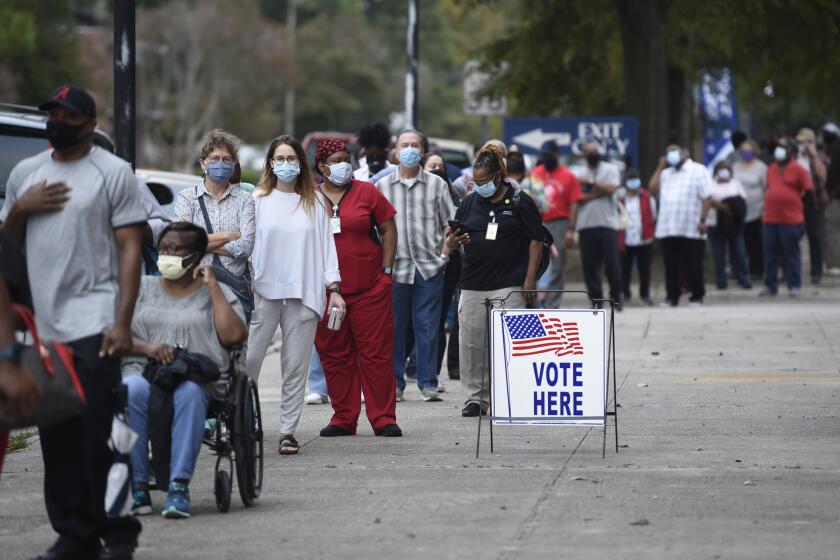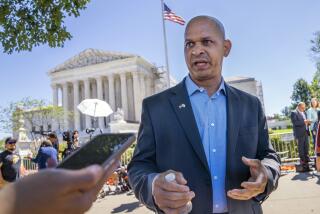Column: The brazen, mind-boggling Republican revisionism regarding Jan. 6? It never ends

There are many ways to describe what happened in Washington, D.C., on Jan. 6, 2021.
It was an insurrection, a riot, an attempt to violently overthrow the results of a legitimate presidential election.
It was the predictable outcome of Donald Trump’s relentless, desperate Big Lie about Joe Biden’s victory and his thinly veiled calls for mayhem.
It was an intelligence failure of epic proportions on the part of the FBI and law enforcement agencies charged with protecting the Capitol and its occupants.
We know from multiple sources that Trump sat in his office for more than three hours, riveted by the violence on television, while advisors, his own daughter and lawmakers in mortal danger begged him to intervene.
Among those who pleaded in vain for help was House Minority Leader Kevin McCarthy (R-Bakersfield), who told his colleagues that Trump’s response was: “Well Kevin, I guess these people are more upset about the election than you are.”
Later that day, on the House floor, McCarthy was — briefly — honest about what had just unfolded.
“The violence, destruction and chaos we saw earlier was unacceptable, undemocratic and un-American,” he said. “It was the saddest day I’ve ever had serving as a member in this institution.”
That is how the day should be remembered.
And yet, the noxious gases had barely dissipated, the broken glass barely swept away when Republican revisionism began: Yes, a handful of people died and dozens of law enforcement officers were seriously injured in hand-to-hand combat described as “medieval,” but it wasn’t Trump’s fault. Maybe the rioters weren’t even pro-Trump.
“Republicans do not join protest mobs,” opined Rush Limbaugh the next day. “They do not loot and they don’t riot. ... But a tiny minority of these protesters, and undoubtedly including some antifa Democrat-sponsored instigators, did decide to go to the Capitol to protest.”
Rush Limbaugh had huge influence in the political sphere, setting the stage for the rise of conservative talk radio with ‘The Rush Limbaugh Show.’
Before the month was out, McCarthy had slouched his way to Mar-a-Lago to regain the good graces of his lord and master. By October, McCarthy was actively trying to undermine the work of the House Select Committee investigating the Jan. 6 attack, threatening to punish telecommunication companies who comply with the committee’s request to preserve phone records of a group of Republican members of Congress involved with the Trump rally that preceded the attacks.
Like so many who have wriggled under Trump’s thumb, former Vice President Mike Pence, whose life was in actual jeopardy on Jan. 6 because he refused to cheat for Trump, has decided his integrity is dispensable after all:
“I know the media wants to distract from the Biden administration’s failed agenda by focusing on one day in January,” he said in October. “They want to use that one day to try and demean the character and intentions of 74 million Americans who believed we could be strong again and prosperous again and supported our administration in 2016 and 2020.”
Ashli Babbitt, who attempted to breach the barricaded Speaker’s Lobby and was killed by an officer, has become a martyr to the Trump-loving right. In July, Trump described her as an “ innocent, wonderful, incredible woman.”
In Georgia’s Cobb County, local Republicans will mark the one-year anniversary of the insurrection with a candlelight vigil, not to honor the courage and lives of the officers who fought to protect our democracy, but for the “J-6 Patriots held in DC prison.”
(For the record, more than 700 people have been arrested in connection with the day’s violence. Seventy-one rioters have been sentenced, mostly on misdemeanor convictions, according to Politico’s Insurrection Tracker; 30 have received prison terms.)
Infamously, Republican Rep. Andy Clyde of Georgia, claimed that video inside the Capitol on Jan. 6 appeared to show a “normal tourist visit.”
Is it preposterous to think these lies may eventually take root? Hardly.
The United States has an unfortunate tendency toward historical amnesia and denial, particularly when it comes to the bad behavior of white people. How else to explain why we fight over the importance of teaching the history and legacy of slavery? Or why the traitors who fought on the Civil War’s losing side have been valorized with statues and namesakes?
A raft of recent polls has revealed that at least among Republicans — which has sadly become the party of white nationalism — the horror of Jan. 6 is beginning to fade.
One year ago, according to a Politico/Morning Consult national tracking poll, 51% of Republicans thought their party was headed in the right direction; that portion has now leapt to 65%.
Panicked Republicans are doing the only thing they can think of — making it harder for people of color to vote
In December, 78% of Republicans in a Quinnipiac University poll said they wanted Trump to run again. Seven months earlier, only 66% had wanted him to run. (Slightly better news: A majority of Americans — 58% — said they don’t want Trump in the race, and 51% think he has been undermining democracy since the 2020 election.)
Democrats, the poll found, are far more likely to describe Jan. 6 as having had a “major impact” on their worldview. But among voters in both parties, the Politico/Morning Consult poll also detected a “weariness” verging on lack of interest in the insurrection.
This is especially worrisome given that Republican politicians have been working overtime to change local and state election laws to suppress votes and pave the way to overturning elections they lose.
Thankfully, the House Select Committee, which has worked behind closed doors for six months, will soon hold public hearings. Americans deserve to hear the truth, and they need to be reminded that Trump was responsible for almost derailing our democracy.
“I think in five or 10 years, when schoolkids learn about Jan. 6, they’re going to get the accurate story,” said Rep. Adam Kinzinger of Illinois, one of two Republicans who have committed political suicide by joining the committee. “And I think that’s going to be dependent on what we do here.”
More to Read
A cure for the common opinion
Get thought-provoking perspectives with our weekly newsletter.
You may occasionally receive promotional content from the Los Angeles Times.














